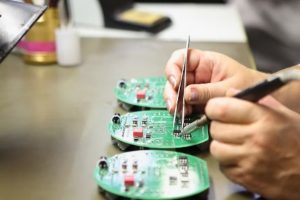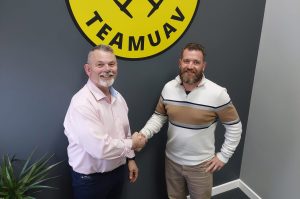Spinout raises £1.5m to build platform for mapping underground space

A new University of Birmingham spinout Delta g has raised £1.5m in its pre-seed investment round to fast-track the commercial availability of its quantum technology gravity gradiometry sensors for mapping the underground space.
The company was founded by Professor Michael Holynski, Dr Andrew Lamb and Jonathan Winch, and is led by CEO Pete Stirling, and is based on technology developed at the University of Birmingham, as part of the UK Quantum Technology Hub for Sensors and Timing.
This aims to transform the efficiency of major infrastructure and repair projects by mapping complex unseen locations quickly, accurately, and without the need for disruptive excavations.
The company’s work will build on extensive research into gravity gradiometry carried out over the past decade at Birmingham, through collaboration between Professor Holynski and Professor Kai Bongs of the School of Physics and Astronomy, and Professor Nicole Metje of the School of Engineering, bringing together an interdisciplinary team of physicists and engineers, working closely with end users such as RSK.
This culminated in the world’s first field demonstration of a practical quantum sensor for gravity gradiometry, realising the detection of underground infrastructure.
The funding round was led by Science Creates Ventures, with further investment from Quantum Exponential Group, Newable Ventures, Bristol Private Equity Club, as well as several angel investors, including Hitesh Thakrar and Howard Covington.
The company will use its new funding to embark on real-world trials with major industrial clients to demonstrate the efficacy of its approach and to further commercialise its technology, reducing the size, weight, power and cost of its hardware so that it can be deployed at scale in the field.
Pete Stirling, co-founder and CEO at Delta g, said: “The UK would massively benefit from delivering major infrastructure projects on time and on budget, and through increased productivity by reducing the time it takes to bring such projects to the point of benefitting people. A big part of this is the difficulty found in mapping the complex unseen environments and hidden critical infrastructure that resides under the ground. Considerable budgets are allocated to ensure that unexpected obstacles can be overcome. On HS2 alone, the contingency for unforeseen ground conditions is £248m.
“While the UK has made great strides in boosting its underground survey capabilities, existing technologies are still limited in their efficacy due to inconsistency, prolonged measurement times and reactive use. Furthermore, if they miss anything, the ramifications could be huge. We solve this problem by making it far quicker and easier to map what the eyes can’t see. Our technology is the culmination of decades of academic research into quantum sensors and their real-world applications, so it’s extremely gratifying that leading VCs have recognised its vast commercial potential.”
“Our goal now is to take the technology and shrink it down so that it’s easier to be deployed in everyday development, infrastructure and repair works. Given the broad applications across myriad industries, we’re hugely excited about our ability to use quantum gravity gradiometry to achieve vast cost-savings and pick up the pace of mapping work in a way that improves everyday life.”
In addition to its latest funding round, Delta g has been awarded a £500,000 innovation grant from Innovate UK to accelerate the delivery of a commercial product and begin the development of a sector-agonistic gravity gradient platform.








